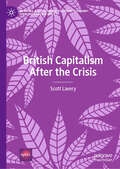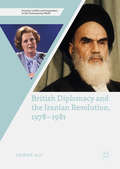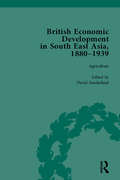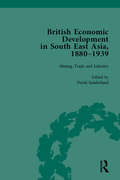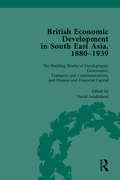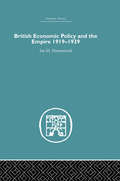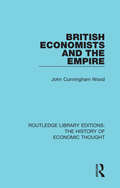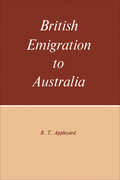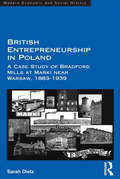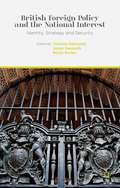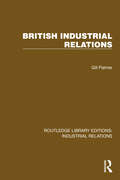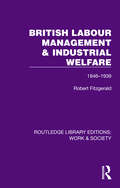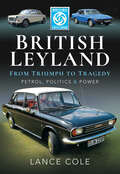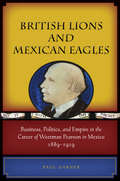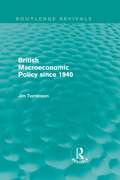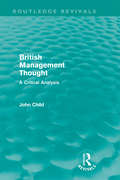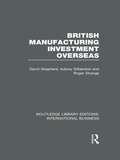- Table View
- List View
British Capitalism After the Crisis (Building a Sustainable Political Economy: SPERI Research & Policy)
by Scott LaveryThe 2008 financial crisis rocked British capitalism to its foundations. More than a decade after the crash, the country is still dealing with its consequences. This book explores the extent to which British capitalism has been reconfigured in this tumultuous period. Advancing an in-depth analysis of the political economy of New Labour, the Coalition and the period after Brexit, the book argues that deep structural weaknesses have been re-embedded within British capitalism. The Coalition promised to eliminate the deficit in one parliament and to ‘rebalance’ the British economy. It did neither. Instead, real wages slumped, uneven development intensified and productivity stagnated. An era of volatile post-crisis politics - exemplified by Brexit, the May government and the rise of Corbyn - emerged in this context, threatening the foundations of the old order. This book is required reading for students and scholars interested in the fractious political economy of British capitalism after the crisis.
British Cost Accounting 1887-1952: Contemporary Essays from the Accounting Literature (Routledge Library Editions: Accounting)
by Malcolm Anderson John Richard Edwards Trevor BoynsThis anthology provides readers with a flavour of the development of cost accounting and emerging management accounting literature from ‘The Costing Renaissance’ to 1952. Many of the issues which were prominent in the middle of the twentieth century are still pressing issues today and received important early treatments. However, a more balanced longitudinal coverage of the relevant material enables readers to trace the development of new attitudes to problems which had been recognized early on and to become aware of the fact that different issues tended to dominate the literature as time went by. The selection bias has favoured material which was covered for the first time or in a new way.
British Diplomacy and the Iranian Revolution, 1978-1981 (Security, Conflict and Cooperation in the Contemporary World)
by Luman AliThis book investigates how British diplomats in Tehran and London reacted to the overthrow of the Shah and the creation of an Islamic Republic in Iran, which had previously been a major political and commercial partner for London in the Middle East. Making substantial use of recently declassified archival material, the book explores the role of a significant diplomatic institution – the resident embassy – and the impact of revolutions on diplomatic relations. It evaluates the performance of those charged with British diplomacy during the Iranian Revolution, as Britain’s position fell from favour under the post-revolutionary regime. Examining the views of key diplomatic personnel at the Foreign and Commonwealth Office and British ministers, this study seeks to explain how British policy towards Iran was shaped and the means of diplomacy employed. In charting the evolution of Britain’s diplomatic relationship with Iran during this period, a number of factors are considered, including historical experience, geography, economics, world politics and domestic concerns. It also highlights the impact of events within the Iranian domestic political scene which were beyond London’s control but which shaped British policy significantly.
British Economic Development in South East Asia, 1880 - 1939, Volume 1
by David SunderlandThis collection focuses on the economic development of the areas of SE Asia with which Britain had a trading relationship. Covering 1880-1939, the economic growth of the region is revealed through a selection of rare primary resources organized thematically with sections dedicated to agriculture, mining, trade, labour, finance and infrastructure.
British Economic Development in South East Asia, 1880 - 1939, Volume 2
by David SunderlandThis collection focuses on the economic development of the areas of SE Asia with which Britain had a trading relationship. Covering 188-939, the economic growth of the region is revealed through a selection of rare primary resources organized thematically with sections dedicated to agriculture, mining, trade, labour, finance and infrastructure.
British Economic Development in South East Asia, 1880 - 1939, Volume 3
by David SunderlandThis collection focuses on the economic development of the areas of SE Asia with which Britain had a trading relationship. Covering 188-939, the economic growth of the region is revealed through a selection of rare primary resources organized thematically with sections dedicated to agriculture, mining, trade, labour, finance and infrastructure.
British Economic Foreign Policy (Routledge Library Editions: International Trade Policy #4)
by J. Henry RichardsonThe financial crisis of 1931 marked a turning point in British economic foreign policy, as decades of laissez-faire principles were abandoned and an active interventionist policy was introduced. This book, first published in 1936, provides an in-depth analysis of the change in Britain’s policies, and the effects these changes had on the various aspects of foreign trade.
British Economic Growth, 1270-1870
by Stephen Broadberry Stephen Broadberry Bruce M. S. Campbell Alexander Klein Mark Overton Bas Van Leeuwen Bruce M. S. Campbell Alexander Klein Mark OvertonThis is a definitive new account of Britain's economic evolution from a backwater of Europe in 1270 to the hub of the global economy in 1870. A team of leading economic historians reconstruct Britain's national accounts for the first time right back into the thirteenth century to show what really happened quantitatively during the centuries leading up to the Industrial Revolution. Contrary to traditional views of the earlier period as one of Malthusian stagnation, they reveal how the transition to modern economic growth built on the earlier foundations of a persistent upward trend in GDP per capita which doubled between 1270 and 1700. Featuring comprehensive estimates of population, land use, agricultural production, industrial and service sector production and GDP per capita, as well as analysis of their implications, this will be an essential reference for anyone interested in British economic history and the origins of modern economic growth more generally.
British Economic Policy and Empire, 1919-1939
by Ian M. DrummondFirst Published in 2005. Routledge is an imprint of Taylor & Francis, an informa company.
British Economic and Strategic Planning: 1905-1915
by David FrenchFirst Published in 2005. Routledge is an imprint of Taylor & Francis, an informa company.
British Economists and the Empire (Routledge Library Editions: The History of Economic Thought)
by John Cunningham WoodThis study, first published in 1983, is primarily concerned with what the British economists over the period 1860 to 1914 wrote on a range of economic and non-economic aspects of the British Empire, and the reasons for their conclusions. The attempt is also made to correct the view that mainstream British economists after 1860 were antithetical to the concept of empire. This title will be of interest to students of economic thought.
British Emigration to Australia
by R. T. AppleyardEach year nearly 30,000 Britons emigrate to Australia under the Assisted Passages Scheme. In return for near-free transport they are required only to stay a minimum of two years in Australia. Are these persons the ne'er-do-wells of British society, the unskilled misfits who have not been able to succeed in Britain? Do they base their decisions to emigrate on reliable information and study economic opportunities in other overseas countries before choosing Australia? To what extent do relatives and friends in Australia and the fact that it is a British country influence their decisions? Why do they leave their homeland – inequality of opportunity; a hostile class structure; the climate? What do they know about the country many of them will never leave and what do they hope to achieve by going there? In 1959 Dr Appleyard and a team of interviewers set out to find the answers to these questions. They conducted long interviews with nine hundred British families (and single persons) just before they sailed for Australia. This book contains the results of the interviews set in the background of post-war emigration to Australia, demographic and economic conditions in each country, government policies which have been formulated to meet these conditions, and actual differences in wage, social services, and the ownership of houses and consumer durables between the United Kingdom and Australia.
British Enterprise in Brazil: The St. John d'el Rey Mining Company and the Morro Velho Gold Mine, 1830--1960
by Marshall C. EakinMarshall Eakin presents what may be the most detailed study ever written about the operations of a foreign business in Latin America and the first scholarly, book-length study of any foreign business enterprise in Brazil. Between 1830 and 1970 the British-owned St. John d'el Rey Mining Company, Ltd. constructed a diverse business conglomerate around Minas Gerais, South America's largest gold mine, in Nova Lima. Until the 1950s the company was the largest industrial firm and the largest taxpayer in Brazil's most populous state. Utilizing company and local archives, Eakin shows that the company was surprisingly ineffective in translating economic success into political influence in Brazil. The most impressive impact of the British operation was at the local level, transforming a small, agrarian community into a sizable industrial city. Virtually a company town, Nova Lima experienced a small-scale industrial revolution as the community made the transition from the largest industrial slave complex in Brazil to a working-class city torn by labor strife and violence between communists and their opponents.
British Enterprise in Nigeria
by Arthur Norton CookFirst published in 1965. The present volume is the first study of British activities in Nigeria that has been written by a non-native and therefore author cannot claim to have discovered many facts that were unknown, he does write from a detached point of view. This study supplies in a small measure the need for more case studies of the imperialistic process.
British Entrepreneurship in Poland: A Case Study of Bradford Mills at Marki near Warsaw, 1883-1939 (Modern Economic And Social History Ser.)
by Sarah DietzDrawing upon an impressive range of international sources, this book explores the late-nineteenth century partnership between Bradford worsted manufacturers the Briggs brothers and the German merchant Ernst Posselt, and their subsequent foreign direct investment in a modern factory and workers’ community at Marki, near Warsaw in Poland. Protectionism and increasing foreign competition are discussed, among many complex economic pressures on British industry, as likely catalysts for this enterprise and the general historiography of the Polish lands is explored to reveal a climate of extraordinary opportunity for well-capitalised foreign industrialists in this period. British, Polish and German press and archival documents, as well as Russian police and factory inspectors’ reports reveal the everyday experience of Polish factory workers and British consular correspondence provides fascinating insight into the machinations of the entrepreneurs and Warsaw’s cosmopolitan business community. Through the development and domination of market and raw materials sources, this venture is shown to have monopolised worsted manufacture in the Russian Empire, using state of the art technology to create, and modern marketing techniques to promote, its product range and evolving image. Marki was described in 1886 as ’a second edition of Saltaire’ and latterly as ’the Polish Bournville or Port Sunlight’, thus aspects of British and Polish social history are compared to assess the efficacy of introducing the model-community concept, in combination with a radical employment policy, to less industrially-developed Poland. The experiences of an expatriate community of skilled Yorkshire foremen and their instrumentality in diffusing British industrial technology throughout the Russian Empire are described. Against a backdrop of political instability and social upheaval, which dramatically impacted on business behaviour after 1905 and particularly during the interwar period of
British Foreign Policy and the National Interest
by Jamie Gaskarth Robin Porter Timothy EdmundsWhose interests does British foreign policy serve? Is the national interest a useful explanatory tool for foreign policy analysts? This interdisciplinary collection responds to these questions exploring ideas of Britain's national interest and their impact on strategy, challenging current thinking and practice in the making of foreign policy.
British Industrial Relations (Routledge Library Editions: Industrial Relations)
by Gill PalmerBritish Industrial Relations (1983) provides a comprehensive and balanced approach to British industrial relations, an often controversial subject with a variety of academic interpretations which achieved a large significance in national politics. The author draws on political and social theory to explain both the state of British industrial relations in the 1980s and the conflicting prescriptions for change. Trade unions and collective bargaining are placed in the context of the inevitable development of group negotiation within complex organisations. The often neglected importance of management strategy in the design of work and in the development of the British system is emphasised and different interpretations on the state’s role in industrial relations are fully explored. This book has a broad ranging approach, using the latest developments in political, labour process, trade union and organisation theories relevant to the understanding of industrial relations. British institutions are the main focus of study but illustrations from Japan, the USA and Germany are also used and the importance of an historical perspective is underlined.
British Labour Management & Industrial Welfare: 1846–1939 (Routledge Library Editions: Work & Society)
by Robert FitzgeraldOriginally published in 1988, this book examines company provision of welfare in the century preceding the Second World War, a period of enormous change in the structure and organisation of British industry and management. The creation of large-scale, corporate companies increased the need for settled, experienced company workforces and for adequate levels of industrial welfare. The paternalistic, frequently ad hoc methods associated with smaller firms were replaced with systematic schemes. This process is illustrated and discussed in 5 detailed case studies with supportive evidence from many other industries. Moreover, the political aspects of industrial welfare are not ignored. The role of employers in influencing the final form of social legislation for the benefit of their own company schemes is crucial to understanding the development of industrial welfare.
British Land
by Lucy WhiteCase - British Land's shares traded below NAV. Laxey investments tried to force British Land into share buybacks and criticized its corporate governance. Laxey voted borrowed shares at the AGM.
British Leyland—From Triumph to Tragedy: Petrol, Politics & Power
by Lance ColeA history of the British automotive manufacturer and an analysis of what went wrong.What really happened at British Leyland (BL)? Was it ‘just’ the cars, or were other factors vital to the story? Who really was to blame for BL and MG Rover’s death?The ‘truth’ about BL is deeper than its cars – were ultra- Left-wing plots to topple BL and British society real? Did secret deals and political intrigue really exist? Was it Labour or Conservative powers who ‘killed’ BL, or was it BL itself? How was it that BL’s design genius was hobbled?Author Lance Cole lifts the bonnet on BL and presents a forensic yet easy to read new analysis in a story of BL, its cars, and the era of their motoring as powers on the political Left and Right waged war, sometimes even with themselves.Here is a book about cars and more, a conversation on all things BL: this is a new account of a classic British story told across a trail of evidence in a British industrial and political drama.Many mistakes made BL, but some of the cars were superb, the designs of genius, the engineering excellent; it is just that we have either forgotten, or been brainwashed into believing the worst.In a BL book like no other, written by a classic car fanatic with a background in industrial design, automotive, and wider journalism, this story lifts the lid on BL's cars and more. The author also adds inside knowledge from time working in the motor industry.Lance Cole tells the deeper BL story across the era of its greatest successes and its biggest failures.“An important and overdue book, well researched which will find a welcome place on the shelves of transport academics and motoring aficionados alike.” —The Journal of the Road Transport History Association“Cole’s engaging and informal writing style makes things very readable and helps us untangle a lot of the more complex shenanigans that went on. With fifty colour and fifty monochrome pictures, it’s well-illustrated too. Thoroughly recommended for its astute insight whether you’re a BL fan or not.” —Car Mechanics
British Lions and Mexican Eagles: Business, Politics, and Empire in the Career of Weetman Pearson in Mexico, 1889-1919
by Paul GarnerBetween 1889 and 1919, Weetman Pearson became one of the world's most important engineering contractors, a pioneer in the international oil industry, and one of Britain's wealthiest men. At the center of his global business empire were his interests in Mexico. While Pearson's extraordinary success in Mexico took place within the context of unprecedented levels of British trade with and investment in Latin America, Garner argues that Pearson should be understood less as an agent of British imperialism than as an agent of Porfirian state building and modernization. Pearson was able to secure contracts for some of nineteenth-century Mexico's most important public works projects in large part because of his reliability, his empathy with the developmentalist project of Mexican President Porfirio Díaz, and his assiduous cultivation of a clientelist network within the Mexican political elite. His success thus provides an opportunity to reappraise the role played by overseas interests in the national development of Mexico.
British Macroeconomic Policy since 1940 (Routledge Revivals)
by Jim TomlinsonOriginally published in1985, Jim Tomlinson charters the route of British macroeconomic policy in the post-war era. This book argues that the objectives of macroeconomic policy have not been constant; that the emphasis has shifted from one item to another over time; and that this uncertainty and inconsistency over objectives goes a long way to explaining why macroeconomics management has not been a startling success.
British Management Thought: A Critical Analysis (Routledge Revivals)
by John ChildFirst published in 1969, British Management Thought is an indispensable text for anyone with a critical interest in the development of British management philosophy, from management teachers, through to informed managers, sociologists and historians. Utilizing detailed documentary evidence, Dr. Child traces and assesses the emergence and development of management thinking in Britain over the last hundred years. He considers the organizational and social problems faced by managers, and how management thinkers have attempted to provide solutions. The book demonstrates how social science research has today brought to light many deficiencies in management thought. By applying the perspectives of the sociology of knowledge, Dr Child examines how and why ideological considerations seriously weakened the practical utility of many management writings. He also discusses the important problems raised for management education by these findings, illustrating this with some of his own research into management teaching.
British Manufacturing Investment Overseas (Routledge Library Editions: International Business)
by David Shepherd Roger Strange Aubrey SilberstonThis study analyses the causes of British manufacturing investment overseas, focusing primarily on the period from the mid 1960s to the mid 1980s. During these years there were significant changes in UK direct investment and this book represented the first major analysis of these changes based on detailed case studies of British international firms. The early chapters assess the available statistical evidence and the theories of overseas investment that had hitherto been put forward. The authors emphasize the need for recognizing the dynamic and varied nature of firms and the relevance of their historical development in order to understand business decision-making. Through a detailed consideration of the activities of a large sample of companies, the book explains why they manufacture abroad and assesses the overall consequences for the British economy of its overseas investment.
British Motorcycle Industry at a Crossroads
by Jan W. RivkinBy 1975, the collapse of the British motorcycle industry is nearly complete. Only one British manufacturer, NVT, remains in operation. In this setting, the British government commissions the Boston Consulting Group to identify and evaluate strategic alternatives for NVT and its suppliers. This case summarizes what the consultants discovered as they sized up the global motorcycle industry and Britain's place in it.
